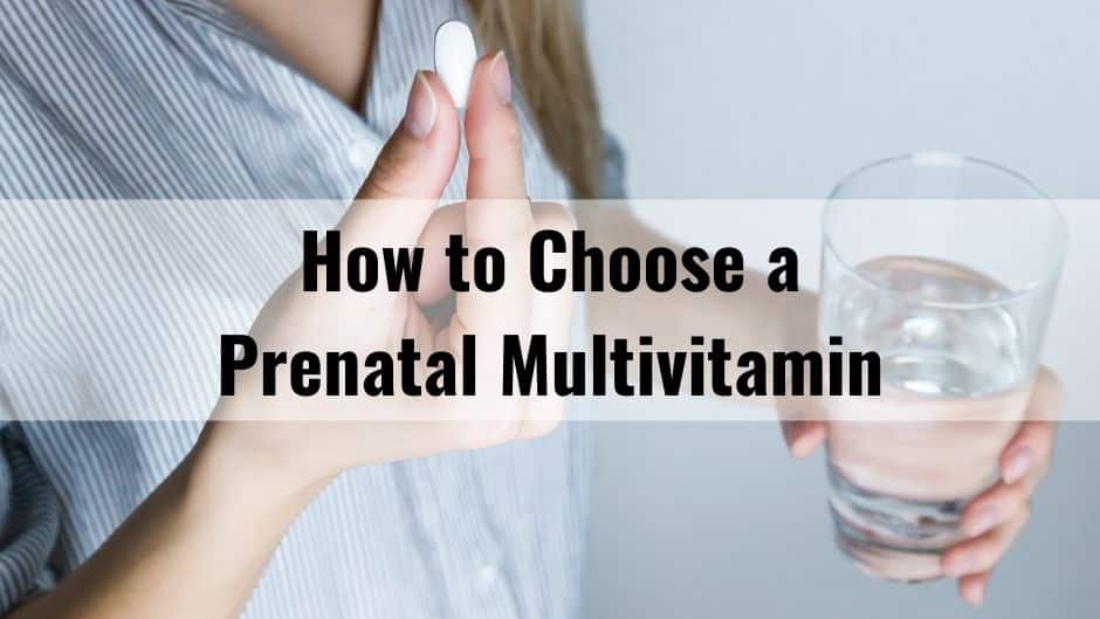Thinking about getting pregnant? Since many pregnancies are not planned, all women who could become pregnant should take a daily prenatal multivitamin.
It is recommended to start taking your supplement at least 3 months before you get pregnant.
Your nutrient requirements are much higher during pregnancy, it is important that you start taking a prenatal multivitamin before you become pregnant to fill any nutritional gaps. You may say “I eat very healthy and balanced”, however, it’s impossible to meet all of your requirements with food alone. This doesn’t mean that you have to spend a lot of money on buying branded supplements from the health food store .
In fact, I often recommend generic brands from local pharmacies or supermarkets as long as the supplement is government regulated and it contains what it says it contains. So I will give you some tips and what to look for when buying a prenatal multivitamin.
FOLIC ACID
Folic acid is super important to help prevent Neural Tube Defects (e.g., spinal bifida – when nerves in the spinal cord are exposed and damaged) in your baby. Choose a prenatal multivitamin that has 0.4-1.0 mg (400-1000 mcg) of folic acid.
Food High in Folic Acid: whole grain breads, leafy green vegetables, legumes (beans and lentils), citrus fruits and juices and most cereals (fortified with folic acid).
IRON
Your iron requirements increase during pregnancy. Your body makes an extra 2kg of blood during pregnancy. In your third trimester of pregnancy, your baby is building iron stores for the first six months of his or her life. Therefore, you need more iron to make the extra blood and to help your baby store enough iron.
When you’re pregnant, it is very difficult to get the amount of iron you need just from diet alone, so choose foods high in iron and take a prenatal multivitamin containing iron (16-20 mg). Your body absorbs iron from meat, poultry, and fish better than iron in other foods. To increase iron absorption, eat a food containing Vitamin C (e.g., strawberries or oranges) and food containing iron at the same time. For example, have vegetables with meat (e.g., chicken stir-fry) or have an orange with a bowl of oatmeal. Coffee and tea can interfere with iron absorption. Limit these drinks and have them between meals rather than at meals.
Best Sources of Iron: beef, pork, chicken, lamb, fish, sardines, shrimp, oysters, mussels.
Good Sources of Iron: legumes (lentils, beans, chickpeas), tofu, whole grain and enriched cereals.
Anemia during pregnancy has been linked to decreased weight gain, preterm birth and babies with a low birth weight. If you become anemic during pregnancy (which is very common), your doctor or dietitian may recommend an additional iron supplement. Iron supplements can make you constipated, so be sure to increase your intake of fibre and fluids.
CALCIUM
Your calcium needs are very high during pregnancy. Calcium helps keep your bones strong. It also helps your muscles and nerves to work properly and helps your blood to clot. During pregnancy, calcium helps your baby build strong bones and teeth.
Most prenatal multivitamins contain about 300 mg of calcium. A prenatal multivitamin will not support all of your calcium needs, so it is important that you’re including calcium rich foods in your diet.
Food High in Calcium: milk, yogurt, calcium-fortified beverages such as soy, rice or orange juice.
Other Food Sources of Calcium: cheese, canned salmon or sardines with bones, tofu made with calcium.
VITAMIN D
Vitamin D is important in pregnancy. It helps keep your bones strong and builds strong bones in your baby (enhance calcium absorption). It also helps your baby build vitamin D stores to use during his or her first few months.
If you have a dark skin, cover most of your skin with clothing or sunscreen, don’t go outside very often or don’t eat very many vitamin D rich foods (see below) you may need to take extra vitamin D supplement.
Food High in Vitamin D: milk, fortified soy beverages, fish such as salmon, trout, herring, Atlantic mackerel, sardines, and Vitamin D fortified orange juice.
Not all milk products are high in vitamin D. In Canada, milk, margarine and some yogurts have vitamin D added to them. In Malaysia, please check you nutrition fact label.
VITAMIN A
Too much Vitamin A can cause birth defects in your baby. If you are taking a prenatal multivitamin (which has vitamin A included), do not take any additional vitamin A supplements. You will get enough Vitamin A from a combination of your food (e.g., carrots, broccoli and squash) and your prenatal multivitamin.
BOTTOM LINE
Healthy eating and taking a prenatal multivitamin helps you prepare a healthy pregnancy. Do not take more than 1 daily dose of a prenatal multivitamin. Supplement do not take the place of food and healthy eating. If you are vegan, on a restricted diet, food allergies or you avoid certain foods, you may be missing important nutrients you and your baby need. Talk to you doctor or dietitian.
So, You’re having a baby? Contact Me, I can help you meet the nutrition needs of both you and your growing baby.


Leave A Comment